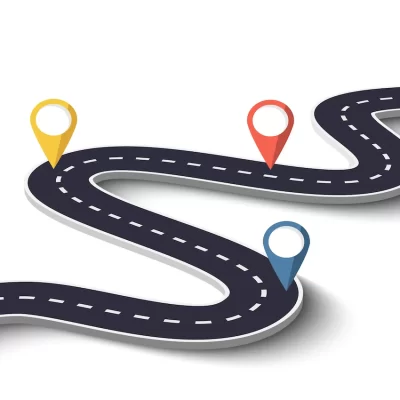If you want your ex back, then you can’t just think about your own feelings.
You also need to understand what’s happening inside your ex’s head after the relationship ends.
Because which stage your ex is it can make the difference between reconnecting… or pushing them away forever.
These are the key psychological shifts that nearly every ex goes through, in one way or another. And when you understand these stages, you’ll have a clearer roadmap for how to handle things.
Just keep one thing in mind: not every breakup is identical, and not every person will move through these stages in the exact same order or at the exact same pace. But in general, the majority of people follow this pattern pretty closely.
Stage 1: Acceptance
Interestingly, the first stage your ex goes through usually happens BEFORE the breakup itself.
That might sound strange, but here’s what I mean:
Long before you hear the words “I think we should break up,” your ex has already been wrestling with the decision.
On some level, they’ve already accepted that ending the relationship is the path they need to take.
Now, that doesn’t mean they’re happy about it. In fact, this stage is usually full of inner conflict.
They may go back and forth in their mind for weeks — or even months — trying to decide whether to stay or leave. During this time, you probably noticed their emotions swinging all over the place. One day they’re distant and irritable, the next day they’re unusually affectionate, then suddenly they’re picking fights again.
That rollercoaster behavior is often a direct reflection of the internal struggle they’re going through.
They know they’re leaning toward ending things, but they can’t admit it to you yet… because that would force them to face it head-on before they’re ready.
Think of it like someone standing at the edge of a cold swimming pool.
They know they’re about to jump in, they know it’s going to be uncomfortable at first, but they’re trying to build up the courage.
That’s roughly what the “acceptance” stage feels like for your ex… they’ve already made the decision deep down, but they’re trying to mentally prepare themselves for the plunge.
So why does this stage matter if it happens before the breakup, and it’s already over? Well, because elements of Stage 1 often resurface later on.
Your ex’s uncertainty, guilt, and emotional swings in the early stages of the breakup often echo again later, especially when they begin doubting whether they made the right choice.
If you can look back and recognize how your ex was behaving before the breakup — the mood swings, the avoidance, the distance — that gives you clues about how they might act in some of the later stages.
So Stage 1 is all about them quietly accepting that the relationship is ending, even while you’re still in the dark.
It’s not fun to realize, but it’s important groundwork to understand what comes next.
And once the breakup actually happens, that brings us to stage 2…
Stage 2: Relief
Once the breakup finally happens, your ex will almost always experience an initial sense of relief.
And I know… that may sting to hear. But it’s a very normal psychological response, and it doesn’t mean anything for your chances of getting them back.
Think about it like this: imagine you’ve been carrying around a heavy backpack all day long. At first, it’s uncomfortable.
Then, as time goes on, you get used to the weight. But the second you take that backpack off your shoulders, you suddenly realize just how much strain you were under. That moment of release feels like freedom.
For your ex, the “backpack” was the stress of anticipating the breakup and the guilt of knowing they were about to hurt you.
The longer they cared about you, the heavier that emotional burden became.
So, when they finally go through with the breakup — when they say the words, pack their things, and walk out the door — they get to set that weight down. And the immediate sensation is relief.
Now, don’t misinterpret this. The relief is not because you were a burden to your ex, or because the relationship was meaningless. It’s not that simple.
The relief comes from no longer having to wrestle with the decision, no longer living with the dread of causing pain. It’s the stress of the decision itself that gets lifted, not the stress of being with you.
Think back to a time you had to deliver really bad news to someone you cared about.
Maybe you had to let an employee go, or admit something difficult to a close friend. Before you said it, you probably felt sick with anxiety. But the moment the words were out, even though you knew it would hurt them, there was that strange wave of relief. The worst part — the moment of actually doing it — was behind you.
That’s exactly what happens for your ex in this stage.
And that relief often shows up as what I like to call “false happiness.” They may act like they’re thriving. Maybe they start posting smiling photos on social media, going out with friends more often, partying, or even diving into a rebound relationship.
To you, watching from the outside, it can look like they’re celebrating being free of you.
But in reality, what you’re seeing is that rush of relief combined with a temporary distraction from guilt. They’re not actually better off without you — they’re just chasing ways to amplify the high of no longer feeling torn in two.
But here’s the key: this stage is temporary. Relief doesn’t last.
It usually fades within a few weeks, sometimes a couple of months at most, depending on how long the relationship lasted and how emotionally invested your ex was.
And here’s another thing: relief almost always comes with guilt attached.
They know they hurt you, and they know they’re feeling better while you’re probably suffering. That guilt lingers, and it will creep back into their mind as they move into later stages.
So while it may look like your ex is living their best life right after the breakup, don’t be fooled.
They’re in the “relief” bubble — and when that bubble bursts, the harder emotions start to hit.
Stage 3: Intrigue
Once the initial relief begins to wear off, something interesting happens: your ex starts to feel curious. This is the “Intrigue” stage.
See, when your ex ended things, they probably assumed they knew exactly how you’d react.
In their mind, they expected you to chase after them, to beg for another chance, to linger around as a “friend,” or to constantly check in.
Why? Because in most cases, that’s exactly what happens — the person who was broken up with desperately tries to hold on.
And let’s be honest, your ex probably walked away with a certain level of ego boost. They knew you loved them.
They knew the relationship had a lot of good in it. And because they were the one to call it off, they subconsciously reassured themselves, “If I ever change my mind, I can always go back. I have options.”
That’s where the intrigue comes in. If you follow my advice and actually resist the urge to contact them — if you don’t beg, don’t plead, and don’t offer yourself up as their emotional safety net — suddenly their expectations are shattered.
Instead of being showered with attention and validation, they’re met with silence. No calls. No texts. No constant reminders of your love.
And this creates a kind of cognitive dissonance for them.
Humans are wired to look for patterns. When something plays out the way we expect, we can relax and move on.
But when the pattern is broken, it nags at us. It leaves us unsettled. That’s cognitive dissonance.
So if your ex expected you to chase, and instead you vanish into silence, that creates an unanswered question in their mind: “Wait, why aren’t they reacting the way I thought they would? Do they not care anymore? Did they already move on?”
That uncertainty is seriously powerful and it drives curiosity.
Now, how does that curiosity usually show up? Well, in today’s world, it often starts on social media.
Maybe they start watching your Instagram stories or liking your posts, just to see what you’re up to. Or maybe they start asking mutual friends about you — how you’re doing, what you’ve been saying, whether you’ve mentioned them.
Sometimes, they’ll even reach out directly. You might get a casual text like “Hey, how are you?” or a comment on something you’ve posted. But don’t be fooled — these aren’t genuine attempts to rekindle the relationship. They’re “tests.” They want to see if you’ll bite.
And here’s the critical part: if you immediately respond, if you pour out your feelings or reassure them that you still want them back, you’ve just given them the closure they were looking for.
You’ve confirmed their ego boost — that you’re still waiting in the wings.
But if you hold back, if you ignore those first couple of breadcrumbs or keep your responses short and unemotional, then you deny them that validation. And that keeps them in a state of mental tension.
Think of it like a cliffhanger at the end of a TV show episode. The unanswered question keeps them hooked.
They can’t stop thinking about it. And the more they think about you, the more they start to miss you.
So the intrigue stage is all about your ex realizing they don’t actually have as much control over the situation as they thought. You’ve created a mystery they feel compelled to solve. And that mystery draws them back into your orbit — even if they don’t consciously realize it yet.
Handled properly, this stage sets the foundation for what comes next: a much more emotional, much more vulnerable stage where your ex starts to worry they may be losing you for good.
Stage 4: Fear of Loss
Now we’ve reached what I consider to be one of the most critical turning points in your ex’s breakup journey: the Fear stage.
Here’s the truth: until your ex actually begins to worry that they might lose you forever, they have no real incentive to come back. Curiosity alone isn’t enough. Relief certainly isn’t enough. They need that little spark of fear — the fear that they’ve made a mistake that can’t be undone.
And this stage usually comes directly after intrigue. Remember, in Stage 3 your ex is curious about what you’re up to.
They’re unsettled because you didn’t react the way they expected. At first, that curiosity feels manageable to them. But as the silence continues, it starts to morph into anxiety.
They begin to realize: “Wait a second. Maybe I don’t actually have as much power over this situation as I thought.
Maybe they’re not sitting around waiting for me. Maybe they really are moving on.”
This is where the worry begins to set in.
Think about it from their perspective. For weeks — maybe months — they told themselves that if they ever wanted you back, they could just snap their fingers and you’d come running. That belief gave them a sense of safety, even after ending the relationship.
But once you’ve been consistently distant, once you’ve refused to feed into their little tests or desperate attempts at validation, suddenly that safety net looks a lot less secure.
And that’s when the panic begins.
I often compare this to the way we treat the sun. Imagine your love as sunlight, and your ex as a houseplant.
For the entire relationship, you were the reliable source of warmth and energy that helped them thrive.
When the breakup happened, it was like winter arrived — the days got shorter, the light got weaker, but the sun was still there in some form.
Now, in Stage 4, it’s as though the sun has disappeared behind the clouds entirely.
Suddenly, that plant starts reaching toward the window, straining for any trace of light it can get. That’s exactly what your ex begins to do here: they lean toward you. They want reassurance, they want contact, they want to feel the comfort of your presence again.
But — and this is very important — they’re not reaching out for the right reasons yet.
At this point, it’s not about rebuilding the relationship or fixing the problems that caused the breakup. It’s about self-preservation. They’re worried about losing their safety net. They’re worried about losing you, yes, but more so about losing the option of you.
So how does this stage usually play out? Often, you’ll notice more consistent attempts at contact.
The occasional breadcrumb from Stage 3 becomes more frequent texts, phone calls, or social media interactions. They might even suggest getting together “just to talk.”
Sometimes, the worry can come out as frustration or even anger. They may ask, “Why are you ignoring me? What did I do to deserve this?” That’s because they’re unsettled and trying to regain control.
Now, here’s where many people make a fatal mistake. When they see their ex panicking, when they finally start getting those calls or texts, they rush to respond. They pour their heart out, they reassure their ex that they still care, they give in to the emotional pressure.
And what happens? The ex feels reassured. The fear goes away.
And suddenly they’re right back in Stage 2: relief. They think, “Okay, good. I didn’t really lose them. They’re still there if I want them.” And just like that, all the progress you’ve made is undone.
That’s why, in Stage 4, the best thing you can do is hold your ground. Yes, your ex is showing signs of missing you.
Yes, they’re starting to lean in your direction again. But they’re not doing it with the right mindset. You need them to feel that worry a little longer. You need them to truly believe that losing you is a real possibility.
It’s uncomfortable, I know. But it’s also the turning point that shifts them from fear of loss into doubt about their decision.
And that’s exactly where you want them next.
Because when the worry deepens into genuine reflection, your ex will begin questioning whether breaking up with you was actually the right move.
Stage 5: Doubt
By the time your ex reaches Stage 5, the emotional landscape looks very different than it did right after the breakup. The relief they once felt is gone, the curiosity has turned into anxiety, and the fear of losing you has started to sink in.
Now they begin asking themselves the question that really matters: “Did I make a mistake?”
This is the stage where your ex starts to seriously second-guess their decision.
Up until now, most of what they’ve been feeling has been reactive — relief at finally ending things, curiosity about your silence, worry that you might be slipping away.
But in Stage 5, those feelings begin to transform into deeper reflection. They start analyzing, comparing, and wondering if they gave up on something they should have held onto.
There are plenty of triggers that can push your ex into this mindset. Sometimes it’s the realization that single life isn’t as exciting as they imagined. Other times, it’s when a rebound relationship fails to live up to expectations.
And often, it’s simply the passage of time — because the longer you’re apart, the more their memory softens.
Human beings tend to filter the past, letting the bad moments fade and clinging to the good. That means your ex is more likely to remember the laughter, the support, and the closeness you shared, while minimizing the conflicts that led to the breakup.
As those positive memories grow louder, the doubts creep in. “Did I walk away from the best thing I ever had?” “What if I can’t find someone else who understands me like they did?” “Did I give up too easily?” Those questions start looping in their mind, and it unsettles them in a very different way than before.
When your ex is in this stage, you’ll often notice their behavior shifting. Unlike the half-hearted breadcrumbs of Stage 3 or the panicked texts of Stage 4, their outreach begins to feel more intentional.
Instead of a quick “hey” or “how are you,” they may start sending messages that carry more weight, like “I was thinking about you today” or “I miss the way we used to [do something specific].” They may even suggest meeting up for a real conversation.
The tone is different too. They’ll often sound more careful with their words, more respectful, and sometimes even apologetic.
That’s because they’re no longer assuming that you’ll be there waiting. For the first time, they’re starting to feel like they might actually need to win you back.
This is the point where your approach should shift as well. Earlier on, keeping your distance was critical. But when your ex enters Stage 5, you can begin to engage more — slowly and cautiously. If they reach out, it’s okay to respond warmly, but you don’t want to overdo it. The goal is to show that you’re open to reconnecting, but only under the right circumstances.
RELATED: What REALLY Happens to Your Ex During No Contact
It’s important that you hold onto your self-respect here. Don’t rush to reassure them or make promises. Let them do some of the work. Let them prove through their actions that they’re not just acting out of loneliness or fear, but because they genuinely want to rebuild something meaningful with you.
Handled properly, Stage 5 is often where real reconciliation begins.
Many of my coaching clients reunite with their ex during this stage because the emotions finally line up in the right way.
But if it’s mishandled — if you chase too hard, or if you push them away completely — then your ex will eventually move into the final stage. And that last stage is one you need to understand clearly: Regret.
Stage 6: Regret
The final stage in your ex’s journey is regret. This is the point where they finally realize they may have lost you for good, and the weight of that realization begins to sink in. Unlike the Doubt Stage, where there’s still hope and curiosity driving their actions, regret feels heavier, more permanent.
It’s the sinking feeling that they threw away something truly valuable and that there’s no easy way back.
At this stage, your ex will often replay the relationship in their mind with a sense of finality.
Instead of wondering whether they made the right choice, they start to believe they made the wrong one. The hope of reconciliation begins to fade, replaced by that hollow, pit-of-the-stomach ache that comes with realizing an opportunity has slipped away.
Regret is painful because it doesn’t leave much room for action. In Stage 5, doubt often motivates your ex to reach out, to test the waters, to see if there’s still a chance. But in Stage 6, many exes stop trying. They may withdraw, go quiet, or even begin acting bitter or resentful.
That’s not because they don’t care — it’s because the loss has damaged their confidence. When people feel they’ve truly missed their shot, they often protect themselves by shutting down or redirecting their emotions into frustration.
For you, this stage can be the hardest to watch. You may sense that they’re sad, that they’re hurting, that deep down they wish they could undo their decision.
But because they believe it’s too late, they don’t make an effort to rebuild. The window of opportunity feels closed. And unless something changes, they’ll eventually try to move on, carrying that regret with them.
Now, it’s important to remember that not every breakup reaches Stage 6.
Many of my clients get their ex back earlier… often in Stage 5, when the doubt is fresh and the possibility of reconciliation still feels alive. But when things do progress to regret, it becomes much harder to turn the tide.
That’s why patience and strategy in the earlier stages matter so much — because the way you handle yourself after the breakup can be the difference between your ex feeling regret too late… or realizing their mistake while there’s still time to repair things.
So where does this leave you? Ultimately, your ex’s emotional state is the key to everything. Their journey through these six stages — acceptance, relief, intrigue, worry, doubt, and regret — is the roadmap to understanding when and how they might come back.
If you can recognize which stage they’re in, you’ll know whether to keep your distance, to hold firm, or to begin opening the door again. And that awareness gives you a huge advantage.




